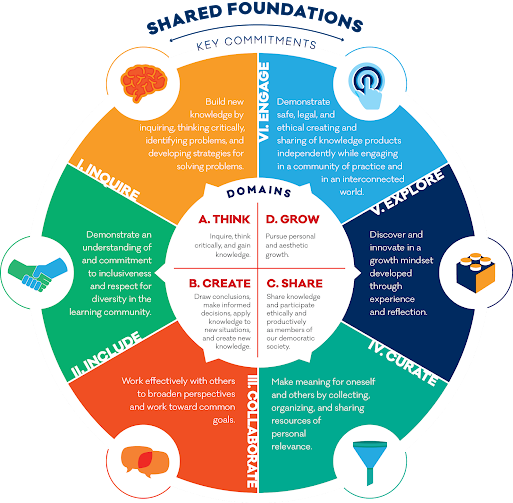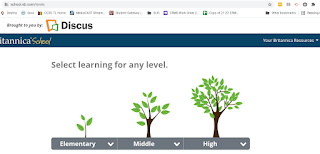Information and media literacy: it's a bitch (I mean bitch in gender neutral terms)
In reading and researching this week I came across a germane analysis of the Association of College and Research Libraries' (ACRL) information literacy framework, in a piece from the Institute of Electrical and Electronics Engineers (IEEE). Professor Cliff Lampe (2021) writes:
This framework focuses more on the dynamic nature of information, the constructed and contextual nature of authority, and information literacy as an ongoing, strategic process in which people engage. This avoids the problems of less complex methods by teaching people to think more deeply and critically about the information they receive, and by rejecting simple ideas of what is true or false (para. 3).
I appreciate how concisely Lampe identifies both context for and considerations made in generating the ACRL framework. His explanation pinpoints so many of the big ideas of effectively teaching young learners how to practice and prioritize information literacy. Information on any number of topics, and from the full spectrum of human perspectives, is increasingly accessible to digital citizens. As a result, it would only be a losing game for us as educators to try to teach students what is true. Rather, emphasis should be placed on how to discern whether information is true, and why it is crucial to do so. The skill sets that the ACRL framework promotes emphasize the importance of critical thinking and multiliteracies for 21st century learners to take forward into higher education, the work force, and life.
In reflecting on what it really means for us to set young people up for success in their future, I think it's valuable to remember that as educators, mentors, parents, as all we are, we're preparing the young people in our lives for a world we won't be around to experience. It's the same work the people who taught us and managed our school libraries were doing, too; using the best available information to prepare us for the unknown landscape of a future that we would create and shape. I never got a lesson on how to use Twitter, Spotify, or YouTube, arguably because who could predict the evolution of those platforms (feel free to sub in your own sources as you read and reflect!), but I was able to apply things I was taught to teach myself how to navigate and explore those resources, and now they are the first places I go to seek out information in my own life. As important as the content of our information diets is, and it is profoundly important, it matters most how we interact with any and all of the information that we encounter, how we teach students to approach information, source evaluation, and learning in general. In The Liturgists Podcast episode we heard this week, Mike talked about discerning "where to look, how to look, how to see" (2017, 0:32), which I thought was a helpful way to frame teaching digital and information literacy. Each step is crucial, but none is sufficient without the context of the steps that come before or after. Conscious information consumers are those who question the accuracy, aim, relevance, reliability, and impact of information.
It is essential for us to teach students how to navigate our digital world, but we should do so bearing in mind that the digital world into which they matriculate is likely to be disparate to the one we function in today, and I think that preparing them to adapt, to examine information critically, and to pursue the truth is how we will ultimately serve them best. Can frameworks and crosswalks and guidelines like those we've examined so far help us all to do that better? YES! Is it likely that all of that guidance will evolve between now and the time we are standing in front of a classroom or library molding young minds? Yes. Does that negate their usefulness today, no! Is this too many rhetorical monologue questions in a row, undoubtedly. I am so glad savvier minds than mine have laid groundwork on which we can continue to develop and hone literacy education. I endeavor to prioritize it in my own work as an educator, to practice and demonstrate critical consumption of information in my life, and to champion the work of industry experts resourcing us with tools to prepare and empower our students for success.
Note: the title of this post is just me making myself smirk, and refers to the song our pals at The Liturgist wrote to teach these concepts. Apologies for any offense, none is intended.
References:
Association of College and Research Libraries. (2015, Feb 9). Framework for information literacy for higher education. American Library Association. http://www.ala.org/acrl/standards/ilframework
Gungor, M. (Host). (2017, March 07). Fake news & media literacy [Audio podcast episode]. In The liturgists podcast. Anchor. https://theliturgists.com/fake-news-media-literacy-podcast-page/
Lampe, & Kun, A. (2021). Beyond Bots and Buttons-New Directions in Information Literacy for Students. IEEE Pervasive Computing, 20(4), 79–81. https://doi.org/10.1109/MPRV.2021.3109579



I liked how you delineated between teaching what is true and how to teach discernment about what is true. It is really the critical thinking step that we need to teach. The mindless scrolling and clicking is what often leads to fake news or viral posts. You have some great, quotable sentences in here like this one, "Conscious information consumers are those who question the accuracy, aim, relevance, reliability, and impact of information." You should consider adding some visuals to your blog to increase readability(play the social media game!?).
ReplyDeleteI loved your point about focusing on being able to adapt to the world as it will likely be very different from the world we are in currently. The idea of being able to adapt and being flexible will be paramount in any age. I also loved how you pin pointed the moment in The Liturgists when they discussed knowing where to look is a big part of discernment. I would add being willing to read different perspectives.
ReplyDeleteEmily,
ReplyDeleteI immediately laughed when I opened your blog and saw the title. I loved the song and started thinking about how I could edit it to fit into the school setting. They hit the nail on the head saying it would be better remembered if placed within a catchy tune. My students love music. What stood out most to be about your thoughts was the need for preparing students for the future of information literacy, technology, digital media. When reading through the P21 Framework the skills of critical thinking, collaboration, communication, and flexibility seemed to me among the most important. Secondary ed hears all the time from not only colleges but the workforce that these are the skills they are looking for in their future employees. The Liturgists ended on one of these that I feel is particularly lacking in today's society, collaboration. We have to not only be able to discern information but we must be able to appreciate, validate, and understand other's views in a way which demonstrates that every one's opinion matters.